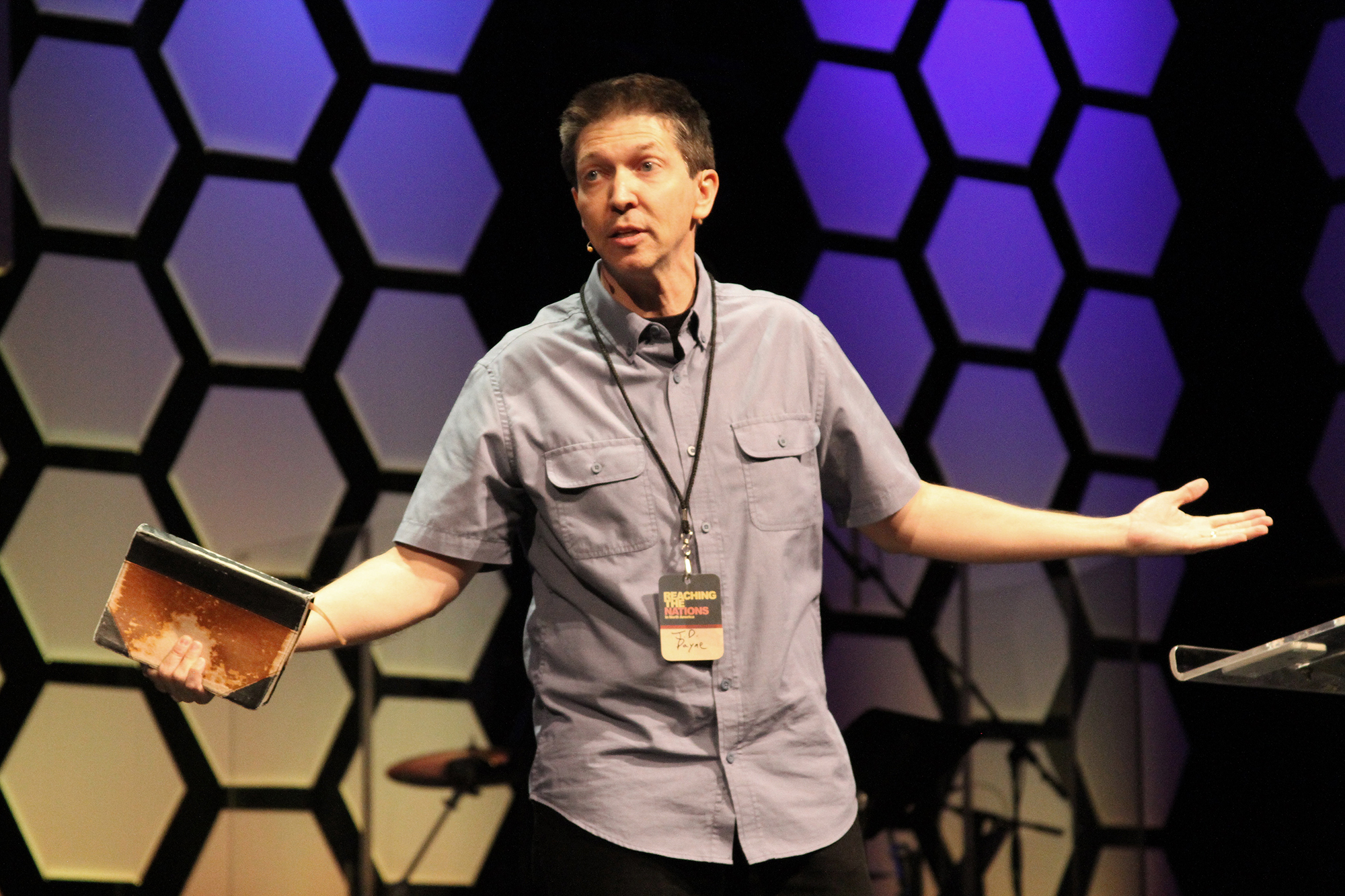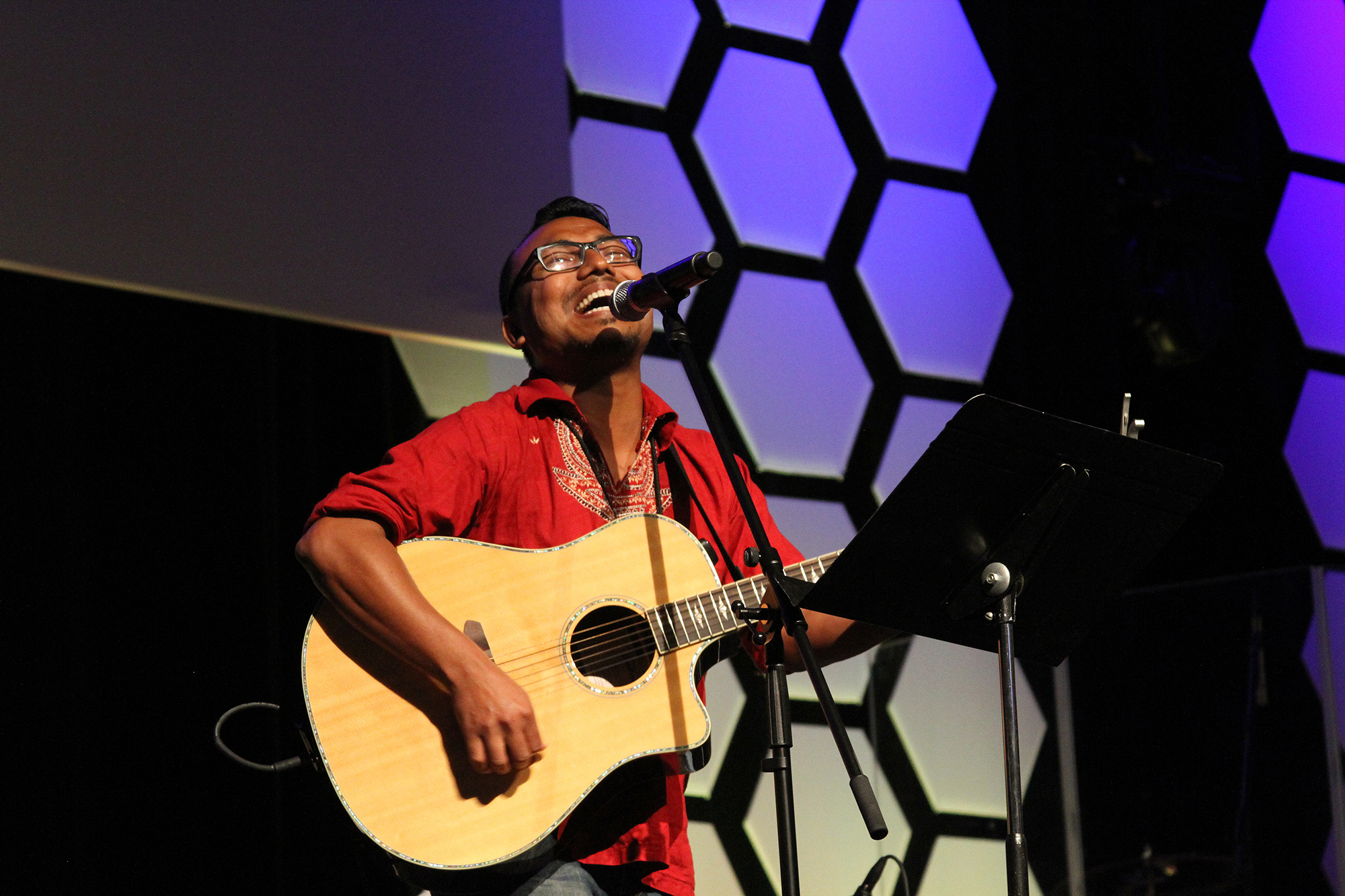
BRENTWOOD, Tenn. (BP) — God is “the Divine Maestro, orchestrating the movements of the nations,” J.D. Payne told attendees during the Aug. 26-27 “Reaching the Nations in North America” conference.
 Payne, pastor for church multiplication with The Church at Brook Hills in Birmingham, Ala., emphasized the importance of churches engaging in diaspora missions, which is the task of evangelizing migrants. The Southern Baptist missions conference was held at Brentwood Baptist Church in Brentwood, Tenn., and exceeded expectations with about 400 attendees.
Payne, pastor for church multiplication with The Church at Brook Hills in Birmingham, Ala., emphasized the importance of churches engaging in diaspora missions, which is the task of evangelizing migrants. The Southern Baptist missions conference was held at Brentwood Baptist Church in Brentwood, Tenn., and exceeded expectations with about 400 attendees.
The conference encouraged attendees to leverage the historically unprecedented migration of peoples around the world for the sake of sharing the Gospel with every tribe, tongue and nationality. The U.S. is one of the most common destinations for migrants, and the circumstances present the American church with a remarkable opportunity for evangelism, according to conference speakers.
Payne said the missions event could be a “catalytic moment” for mobilizing American Christians “until the strangers next door are strangers no more.”
 Speakers included Payne; Frank S. Page, president of the Southern Baptist Convention Executive Committee; Ed Stetzer, executive director of the Billy Graham Center for Evangelism at Wheaton College; and Jenny Yang, vice president of advocacy and policy for World Relief, a refugee resettlement organization. Boto Joseph, an India-native church planter in New York City, led the group in musical worship, which included songs in multiple languages.
Speakers included Payne; Frank S. Page, president of the Southern Baptist Convention Executive Committee; Ed Stetzer, executive director of the Billy Graham Center for Evangelism at Wheaton College; and Jenny Yang, vice president of advocacy and policy for World Relief, a refugee resettlement organization. Boto Joseph, an India-native church planter in New York City, led the group in musical worship, which included songs in multiple languages.
Additional leaders conducted breakout sessions, along with a cultural immersion experience in the Nashville area’s diverse communities.
“It is my prayer that the summit launched a discussion in Southern Baptist life whose volume will only grow louder in the days to come — as Christ-followers from every facet of the Southern Baptist Convention seek to engage our 47 million foreign born neighbors with the Gospel of Christ,” said Chuck Register, executive leader of church planting and missions partnerships for the Baptist State Convention of North Carolina.
Register and staff from North Carolina’s convention, an event sponsor, helped coordinate the conference, along with help from the International Mission Board, North American Mission Board, Southeastern Baptist Theological Seminary, Southern Baptists of Texas Convention and the Tennessee Baptist Convention (TBC).
Yang spoke to attendees from personal experience and on-the-job expertise. She said, “We have an opportunity to make disciples of every nation without even having to leave our own backyard. It is not an accident that our neighborhoods are transforming. … The diversity of this country means that God wants people to hear the Gospel.”
She shared multiple immigrant stories, including her own father’s immigration experience, recounting how he came into contact with the Gospel because of his travels.
“Eighty-six percent of the immigrant population in North America are likely to either be Christian or become Christian,” Yang said, citing work by Timothy Tennent, professor of World Christianity and president of Asbury Theological Seminary in Kentucky.
“That’s far above the national average,” she noted. “The immigrant population actually presents the greatest hope for Christian renewal in North America. This group we want to keep out is actually the group that we need most for spiritual transformation.”
A conference attendee, Cody Beasley from Oaks Church in Raleigh, said the statistics were shocking. He and his wife Aly want to use what they learned to help them better communicate the Gospel to Muslims and other internationals.
“It’s something that I’m passionate about,” Beasley said.
Yang pointed to the Bible as the Christian foundation for ministry to immigrants, while noting that some evangelicals take adverse political stances on immigration.
“Almost every single major biblical character from the Old Testament to the New Testament had some kind of migration experience, and it was through that migration experience that they experienced God,” she said, highlighting the stories of Abraham, Joseph, Ruth and David.
Even Jesus was a migrant, Yang said. “We are followers of a Middle Eastern refugee.”
He was a young, single, male, religious minority from the Middle East, she said. “My question to all of us is, ‘If Jesus were alive today, would we let Him into our country?'”
Stetzer acknowledged the need for just and sustainable border security, mentioning the “build a wall” position of many political conservatives in America.
“We might differ on that,” he said. “But you can’t differ and be a Christian on the call of Jesus to reach all kinds of people from different nations. … Our task is to be about the mission that Jesus has given us.”
Stetzer noted, “In the midst of the politics we’re called to be prophetic.”
Breakout sessions of the conference highlighted tools and resources for discovering and engaging internationals, along with mobilization strategies for churches, associations and conventions.
Lewis McMullen, TBC church planting specialist, organized teams for a cultural immersion experience. One group visited the Islamic Center of Tennessee in Nashville, where they met local Muslims and received a guided tour of the facility. Afterward they shopped in a nearby ethnic market. Another team visited a Buddhist temple in the area.
“The greatest needs for disciple making and church planting are outside of North America,” Payne said as he gave the closing talk. “But there is something missionally malignant if we’re willing to risk and take great sacrifices to travel across oceans to share the Gospel and we’re not willing to walk across the street to the strangers next door.”
















